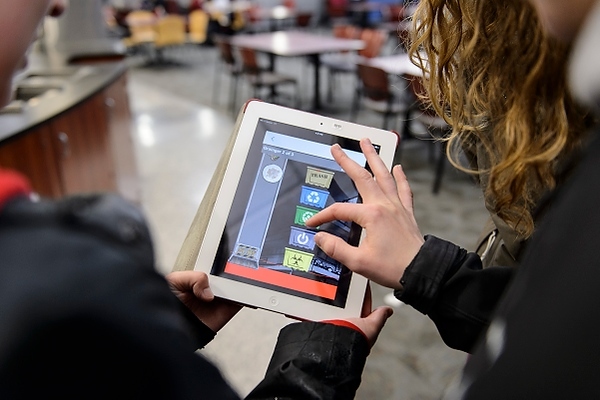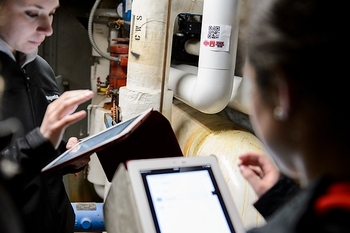Mobile sustainability game spurs students to take environmental action

Armed with smartphones and tablet computers, a group of students from an introductory environmental studies class test Sustainable U, a mobile gaming application, in a dining area in Grainger Hall. Watch a related video.
Traversing the University of Wisconsin–Madison campus while consulting iPads and smartphones, the students in Cathy Middlecamp’s introductory environmental studies course could have been mistaken for anyone checking social media en route to class.
But for these students, class was already in session. Middlecamp, a professor in the Nelson Institute for Environmental Studies, partnered with the UW Mobile Learning Incubator to have students in Environmental Studies 126 playtest a new mobile game under development that explores sustainability features on the UW–Madison campus.
Called “Sustainable U,” the mobile game was designed with support from a Sustainability Innovation in Research and Education (SIRE) grant from the UW–Madison Office of Sustainability. The Mobile Learning Incubator is supported by the academic technology group of the Division of Information Technology (DoIT) and Educational Innovation, an initiative of the provost’s office.

Students search the basement of North Hall for signs with QR codes they can scan to discover information about waste, water or energy use.
The premise of the game is that a visitor from the future shows players a bleak future for Madison unless they take action on environmental challenges.
The app directs players to find signs posted in campus buildings and scan a code with their mobile device to pull up information, videos, or games related to waste, energy, water or transportation. By completing each site, the students can change the course of the future.
The intent is to get students to see the familiar in a new light. “We want you to open your eyes and start seeing the things that may have gone unnoticed,” says Sustainable U designer David Gagnon as he introduces the game to a lab section of ES 126.
“To help students learn topics in environmental science, I wanted to utilize things that were right here on our campus,” says Middlecamp. She and Nelson Institute graduate students Travis Blomberg and Tim Lindstrom worked with Gagnon and John Martin at the Mobile Learning Incubator to link the technology with hands-on learning to better engage students.

Cathy Middlecamp partnered with the UW Mobile Learning Incubator to have students in her Environmental Studies 126 class test the new mobile game.
The game makes “things that are abstract in a book or lecture become really concrete,” Gagnon says — sometimes literally, as he describes the installation of cisterns used to manage stormwater on campus.
As the students crisscross campus, they consult a map within the app to search for their next code. The game takes them from the heating system in the basement of historic North Hall to a green roof atop 333 East Campus Mall. They learn about campus recycling and composting with a waste sorting game at Union South (where a pilot post-consumer composting program is underway) and campus energy sources at the Charter Street Heating Plant.
“After the playtest, every student commented that they had seen something new; whether it was a feature they pass by every day or a building they had never visited,” says Blomberg.
“I’ve heard students called ‘digital natives’ because we have spent so much of our lives both growing up, and working now in front of a computer screen,” says student Ethan Mark, a junior studying economics and Chinese. “Targeting students with an app is a great way to present classroom content in a different way that is familiar to college students.”
With feedback from the pilot testing, MLI is now refining and expanding the game for a full rollout, which will be available this fall to anyone on campus with a mobile device.
Tags: environment, gaming, learning, research, sustainability, technology


